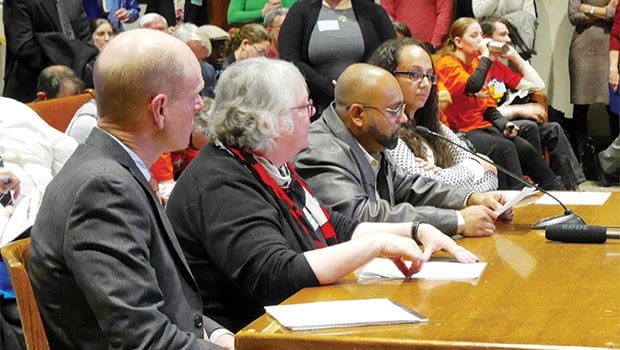Advocates debate millionaire tax
Funds would go to transportation, education

Supporters and opponents testified at the State House last week on a proposed constitutional amendment that would impose an extra 4 percent state tax on annual income over $1 million in order to generate funds for public education and transportation projects.
Initiated by the Raise Up Massachusetts coalition and predicted to generate approximately $1.9 billion in new revenue, the amendment could go before voters in 2018.
“The Fair Share Amendment would provide essential revenue to make much-needed investments across all levels of public education and enhance our transportation infrastructure,” testified Barbara Madeloni, president of the Massachusetts Teachers Association, at a three-hour hearing of the Joint Committee on Revenue.
“In recent years, we’ve seen the divide between rich and poor grow to historic levels,” Madeloni said. “… We think it is fair to ask those who have reaped the biggest rewards from our economy to pay a fair share toward reversing barriers to success for Massachusetts families.”
Other supporters testifying included transportation advocates, teachers, parents, senior citizen advocates, clergy and experts on economics and budget policy.
Opposition was voiced primarily by representatives of business and tax watchdog groups.
Eileen McAnneny, president of the Massachusetts Taxpayers Foundation, argued that an income tax increase imposed on a relatively small segment — the new tax would affect fewer than 20,000 taxpayers — would increase the “volatility” of the state’s revenue stream and have negative consequences as millionaires and businesses opted to exit Massachusetts.
“I think the best way to help folks is to provide employment opportunities and create jobs,” McAnneny said under questioning from Revenue Committee members.
John Regan, executive vice president of Associated Industries of Massachusetts, noted that higher earners pay more in absolute tax dollars than lower earners, and called the new tax unfair.
“It seems like a massive increase, and seems anything but equitable to me,” he said.
Rep. Jay Kaufman of Lexington, one of the Committee co-chairs, took issue with Regan’s line of reasoning.
“When I see the wealthiest among us paying under 5 percent of household income in state and local taxes, the poorest paying 10 percent and the vast majority of us paying around 9 percent, that seems fundamentally unfair to me,” Kaufman said.
Arnold Hiatt, former president of Stride Rite footwear, spoke in favor of the amendment.
“Based on my experience, the only way to be competitive with other states is to invest in an educated workforce,” said Hiatt.
Representatives of the Massachusetts Budget and Policy Center noted that the state’s highest income households now pay a lower share of household income in taxes than other Massachusetts households, as Kaufman pointed out. MassBudget’s recent report also finds that transportation infrastructure investments create a competitive advantage over other states and regions.
Academic support
A group of 71 economists from dozens of colleges and universities across Massachusetts submitted a written statement supporting the amendment. They reiterate that the proposed increase applies only to the portion of annual income above $1 million, call it “fair,” and assert that the new tax would yield economic gains, not reduce growth.
On the web
Raise Up Massachusetts: http://raiseupma.org
MassBudget report, “Building a Strong Economy: The Roles of Education, Transportation, and Tax Policy”: http://bit.ly/20pQC74
Economists’ testimony: http://bit.ly/1S7H3IO
“While a very small number of wealthy taxpayers may decide to move in response to higher taxes, most will not,” the statement reads. “… When taxes on the very rich are increased, the net result is an overall gain in revenue.”
The economists note that the higher 9 percent rate would be similar to rates on high earners in several other states, including New Jersey, New York, Vermont, Iowa, Oregon and Minnesota, and lower than in California, where income tax on top earners is 13.3 percent.
About a dozen states have raised taxes on their highest income tax brackets since 2009. Some of those states apply the higher rate to annual incomes far lower than $1 million, according to a 2014 Pew Charitable Trusts analysis. For example, Maryland increased taxes for singles earning $100,000 or more and joint filers earning over $150,000; California voters approved a proposition that created new income tax rates for those earning over $250,000; and Minnesota raised the tax rate from 7.85 to 9.85 percent for joint filers earning over $250,000 a year.
Massachusetts Education Secretary Jim Peyser does not support the proposed amendment, despite its aim to aid public education.
“Raising taxes on Massachusetts workers is not how this administration deals with the spending problem on Beacon Hill,” Peyser said in an emailed statement, noting that the Baker administration has increased spending on public K-12 and higher education.
Education advocates say the Baker administration’s nominal increase in the state’s Chapter 70 funding was not enough to keep pace with the rising costs of education.
Last fall, Raise Up Massachusetts volunteers gathered 158,000 signatures as the first step in the long constitutional amendment process. The coalition recently pushed successfully for a Massachusetts minimum wage hike and a new paid sick leave law.
The Fair Share Amendment text, which organizers said was approved by the attorney general’s office, directs the new tax revenues to be used only for “quality public education and affordable public colleges and universities, and for the repair and maintenance of roads, bridges and public transportation.” The $1 million income specification would be adjusted annually to reflect any increases in cost of living.
The next step for the petition is to be approved by the Revenue Committee, then sent for deliberation at a constitutional convention this spring, and again in 2017. If it wins the support of 25 percent of legislators both times, the amendment will go before Massachusetts voters in November 2018.






